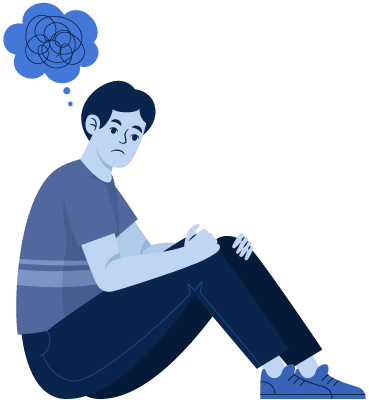Both men and women can experience mental health problems throughout their lifetimes. But men’s mental health is an often overlooked health concern. And mental health can affect males differently than females.
Some of the most prevalent mental health conditions that men can develop are depression, anxiety disorders like worry and fear, schizophrenia, PTSD and substance abuse. Anxiety and depression rates among men are very high, with many cases going undiagnosed and untreated. Suicide or attempted suicide may be an outcome of undiagnosed mental health issues.
In Canada, the following groups have the highest rates of or risk of suicide:
- Men and boys; males are three times more likely to die by suicide than women, though women have a higher rate of attempted suicide.
- People serving federal sentences
- Survivors of suicide loss and survivors of a suicide attempt
- Indigenous peoples, especially youth
- LGBTQ+ youth
Men’s issues can develop from different causes and triggers than those that affect women and often are a result of social expectations or traditional gender roles such as “be the breadwinner”, exhibit masculine traits, be self-reliant and not to be emotional.
Holding on to these beliefs can negatively impact men’s mental health and keep them from accessing support and treatment. As a result, men are likely to downplay their symptoms, which means they are more likely to be more deeply unwell before they seek help. This is likely true whether the symptoms are mental or physical.
At Federated Health Charities, one of our participating charities is the Institute for Advancements in Mental Health (IAM). IAM grew from serving just the schizophrenic community to an organization dedicated to “supporting people with mental illness, innovating solutions to bring back to communities, and driving change for better mental health.” For services, they can be reached at 1-855-449-9949 or support@iamhealth.ca.

Here is Christopher’s Story (Fellow OPSer, Ministry of Citizenship and Multiculturalism)
The COVID-19 lockdowns brought unprecedented challenges for everyone, and as an extrovert, I found the forced isolation especially challenging.
Suddenly, the vibrant social interactions that fueled my energy were replaced with an eerie silence. I was lost in this fog of uncertainty. Initially I dismissed my unease, telling myself, “Oh, this is fine, I’ll be okay,” unaware of the storm brewing within.
As the weeks turned into months, the isolation became a new, unsettling norm. The routine and structure that once anchored my days vanished, leaving me adrift. The toll on my mental health was creeping up on me without warning.
The breaking point came unexpectedly during a long-awaited family get-together. As we drove home along the Don Valley Parkway, an overwhelming sense of dread washed over me. I sat unusually quiet, my usual chatter replaced by a growing fear. My heart pounded, my palms were clammy, and I was convinced we were going to crash. The anxiety attack was like nothing I had ever experienced. I was forced to pull over and let someone else take the wheel for the rest of the journey.
That harrowing experience was a wake-up call. It revealed just how deeply the lockdowns had affected my mental health. I realized that I had been ignoring significant signs of anxiety, thinking I could handle it on my own.
The landscape becomes even more complex for some who do not seek professional help due to a lack of culturally sensitive services.
We are so lucky in the OPS to have the Employee and Family Assistance Program – Total Mental Health (EFAP-TMH). This service provides professional, confidential support services at no cost and includes unlimited counselling sessions for yourself and your family.
Four years later, and my friends and family are probably tired of hearing me go on about meditation, spirituality, going for walks or stepping into the sauna/ice bath (yes, I do that), I have found what works for me and I feel a greater sense of peace and balance in my life.








